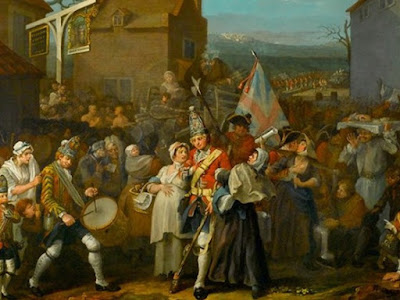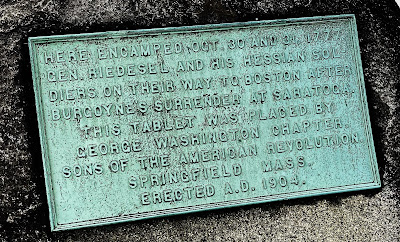West Springfield, Part II - “To Have A Look At The Prisoners”
Accounts of the German column's passage through Blandford and Westfield, to West Springfield suggest they were a hard pressed lot; wet, muddy and worn out. When Burgoyne surrendered at Saratoga on October 17, 1777, his troops had been in the field for four months. A few months after they arrived at their barracks on Winter Hill, a German officer would tell friends at home that they were looking forward to receiving their baggage that had been left in Canada at the start of the campaign. New clothes would be welcome he wrote, as: "You can hardly conceive, however, how we need these things to clothe ourselves once more. The soldier has worn his uniform over three years, and this on shipboard, in forests, and then winters in barracks. The officers took only their most essential and poorest things from Canada and are sighing for new clothing." [1]
The day before the Germans arrived in West Springfield, some soldiers had lost their shoes to the muddy roads, while others had seen theirs simply fall apart from hard wear. [2] In Cambridge, a week later, one resident of that town observed that on their arrival the Germans were: "... a Sordid Set of Creatures in human Figure - poor dirty emanciated men, great numbers of women, who seemd to be the beasts of burthen, having a bushel basket on their back, by which they were bent double, the contents seemd to be Pots & kettles, various sorts of Furniture, children peeping thro gridirons..." [3]
The German column had marched for six days after their last halt in Kinderhook, New York, before they stopped in West Springfield for two days. Some soldiers, "marauders and sick people", had fallen behind the main body. As a result, in addition to drawing drawing provisions for the next stage of their march, a handful of officers and sergeants "... were sent back on different roads to seek them out and bring them back to their reg[imen]ts". [4] Others took advantage of the halt to clean up, one officer noting: "I got a shave early in the morning and powdered my hair." [5]
Regardless of their appearance, the residents of West Springfield flocked to see them as soon as they arrived. According to one German officer: "From the village and all the neighborhood whole families with wives and daughters came marching in and went from house to house, in order, as they said, to have a look at the prisoners. Every one from the General down had to stand for this. The greater the rank, the longer and more attentively was one looked at. I was glad they were soon done with me, but my brigade commander had to endure more, no matter how sour a face he made. I offered the pretty girls chairs which they accepted, thus I gained time to get revenge by looking at them attentively in my turn. Finally we got heartily sick of the jest, for one party after another walked boldly into the room without even knocking. I almost believe our host charged admission." The following day he would note: "The 30th, we had a day of rest, but no rest in the matter of being looked at." [6]
The residents of West Springfield had several days to observe the Convention Army. Some may have even gotten a glimpse of its commander. The first of the prisoners reached town on Wednesday, October 29th, and stayed for two nights before leaving on October 31st to cross the Connecticut River. On November 1st, British Lieutenant-General John Burgoyne passed through town under guard, after spending the night before in Westfield, and crossed the river to stay in Springfield. [7] What remained of the Convention Army would pass within ten miles of West Springfield in November of 1778, on the march to Virginia, but it doesn't appear that they went though the town. Rather, it was noted of their march from Wilbraham, Massachusetts, to Enfield, Connecticut, that on November 18, 1778: "Today we marched continuously through woods and did not see a house for about 5 or 6 miles...". [8]
While looking at how long the Convention Army was in West Springfield, I noticed something about the tablet on the town common, across from the Josiah Day House. In addition to describing Major-General Friedrich Adolph Riedesel and his troops as "Hessian" soldiers, though most were from Brunswick, it has the dates of their stay wrong. Given what we know from the diaries of the Convention Army, the German column spent the nights of October 29th and 30th in town, not the 30th and 31st. Still, this is one of the few plaques that commemorates their march, and the route that they followed in 1777.




Comments
Post a Comment